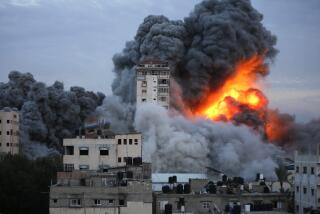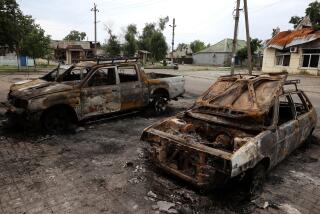A Hazy Target
- Share via
SOUTH POMFRET, Vt — For all their differences, proponents and opponents of war with Iraq agree on one thing: The paramount threat posed by Saddam Hussein is his possession of chemical and biological weapons.
“The one respect that we think most about and worry most about is an enemy with weapons of mass destruction,” Deputy Secretary of Defense Paul D. Wolfowitz said last month. Opponents of war with Iraq have much the same view.
Administration leaders argue that only war can smoke out Hussein’s hidden biochemical capabilities. Doves argue that we must rely on inspections because attacking Hussein could provoke him to use chemical or biological weapons; if Israel were hit, they warn, the result could be nuclear war. By different routes, the two sides arrive at an almost obsessive focus on Iraq’s chemical and biological weapons.
Each side has practical as well as principled reasons for doing so. For the administration, equating chemical and biological weapons with nuclear weapons -- and warning that, sooner or later, Iraq’s weapons will find their way into terrorists’ hands -- has become a way of making the case that war with Iraq is essential to protecting American lives at home.
For those who oppose the U.S. position, treating chemical and biological weapons as weapons of mass destruction akin to nuclear weapons justifies diplomacy and brinkmanship because of the seeming horrendous consequences of failure.
The question is whether these weapons in fact form a foundation sufficient to support all the weight being placed on it.
Instructively, the one place where policy is not being driven by the focus on chemical and biological weapons is inside the American armed forces.
For one thing, while not dismissing the seriousness of chemical and biological warfare, most field commanders are reasonably confident they can handle any such attacks Hussein can mount. For another, they understand all too well the mass destruction a full-scale war might inflict.
Moreover, most know that, after nearly four months of renewed weapons inspections by the United Nations and the most intensive effort in the history of the U.S. intelligence community, American analysts and war planners are far from certain that chemical and biological weapons even exist in Iraq’s arsenal today.
Incredible as it may seem, given all the talk by the administration -- including Secretary of State Colin L. Powell’s discourse last week about continuing Iraqi deception -- there is simply no hard intelligence of any such Iraqi weapons.
There is not a single confirmed biological or chemical target on their lists, Air Force officers working on the war plan say.
No one doubts that Iraq has consistently lied and cheated about its proscribed arms capabilities. This is a country that has used chemical weapons against Iran and against its own population, a country that fired missiles at Israel and its Arab neighbors in 1991.
And the rundown of Iraqi weapons that remain incompletely accounted for since the 1991 Gulf War is daunting: 6,500 bombs filled with chemical agents, 400 bombs filled with biological agents, 31,500 chemical munitions, 550 artillery shells loaded with mustard gas, 8,500 liters of anthrax.
Moreover, CIA and Defense Intelligence Agency analysts believe that Hussein’s forces could launch two types of short-range missiles, rockets or artillery that are capable of carrying chemical agents. The analysts say Iraqi aircraft or unmanned drones could mount sprayers to disperse chemicals or biological agents.
Analysts also think it possible for Iraqi commandos to penetrate coalition lines with small quantities of these weapons.
And U.S. intelligence has received reports that Special Republican Guard units, as well as secret police and security services charged with defending the regime, have been given bio-chem protective gear. President Bush, in his Feb. 8 radio address, said the administration had intelligence “that Saddam Hussein recently authorized Iraqi field commanders to use chemical weapons.”
“We cannot rule out of course that Saddam might try in some kind of desperation to use chemical or biological weapons,” National Security Advisor Condoleezza Rice said, echoing the administration line.
Yet, in fact, there is as much uncertainty as certainty about Iraq’s capabilities, as well as about the military effectiveness of any 11th-hour resort to chemical and biological weapons. So much of what the U.S. believes is based upon Iraq’s history, not knowledge of current conditions.
Vice Adm. Lowell Jacoby, director of the Defense Intelligence Agency, said as much when he told Congress last month that U.S. beliefs were “based on ... past patterns and availability ... that he will in fact employ them.”
But the thinking that lies behind such statements when made by military professionals is quite different from that underlying the pronouncements of Rice and Wolfowitz.
When Maj. Gen. John Doesburg, the Army’s top biological and chemical defense commander, says the United States must assume Hussein thinks “it’s OK to use chemical agents, because he’s done it,” the general is simply engaging in the kind of worst-case thinking that professional soldiers are trained to do.
“What does he plan to do? I have no idea,” Brig. Gen. Stephen Reeves, Army program officer for chemical and biological defense, said at a Pentagon news conference last month.
Military leaders like Doesburg and Reeves do not mean to suggest that chemical and biological weapons are the battlefield equivalent of nuclear weapons. And they certainly do not mean to suggest such weapons are so uniquely horrific that they should drive the nation’s policy decisions -- either toward or away from war.
Among other things, using chemical and biological weapons effectively is so difficult that this alone has always been considered a major impediment for Iraq. The weapons are unpredictable. Weather conditions are a major factor. Chemical and biological agents also have to avoid exposure to heat, light or severe cold.
When U.N. weapons inspectors were in Iraq during the 1990s, they found it had turned toward unmanned ground vehicles and sprayers as platforms for delivering chemical and biological weapons because Iraqi engineers could not master the technology for delivering such weapons in missiles or artillery shells; loaded into the warheads, the chemical and biological material was usually incinerated when the warhead exploded.
Moreover, “it takes a lot of chemicals to have a significant effect on the battlefield,” Doesburg told Bloomberg News. “We don’t suspect he has the stockpile.”
According to war planners, three aspects of U.S. military strategy are specifically related to preventing the use of such weapons once open hostilities begin.
First, initiating the use of force across all fronts, with simultaneous air and ground operations, will communicate what Wolfowitz calls “the inevitability” of Hussein’s demise. “No one wants to be the last one to die for Saddam Hussein,” he said.
Second, the war plan itself favors smaller and more highly dispersed formations to limit exposure to the kinds of brute-force chemical attacks that occurred in Iraq’s war with Iran.
Third, early air and special operations assaults, particularly in western Iraq, will seek to disrupt any potential attacks on Israel.
Despite so little hard evidence of Iraq’s capabilities, U.S. troops have been vaccinated, trained, equipped and dressed to prepare for chemical and biological war. For military units, all this is no more than prudent planning.
For the rest of us, we must take care that apprehension about weapons of mass destruction -- whether generated from hawks or from doves -- does not become a substitute for thinking through the justification to go to war, a decision that could have consequences for years to come.
There have been recent reports that U.S. Marines in Kuwait were literally using “sentinel” chickens to aid in the early detection of chemical and biological weapons.
“I just have to tell you from personal experience,” said Reeves, “having had a great-uncle with a chicken farm, chickens are spectacularly nervous animals. They will literally worry themselves to death.”
Exactly.
More to Read
Get the L.A. Times Politics newsletter
Deeply reported insights into legislation, politics and policy from Sacramento, Washington and beyond. In your inbox twice per week.
You may occasionally receive promotional content from the Los Angeles Times.










